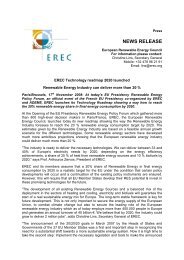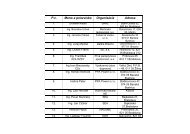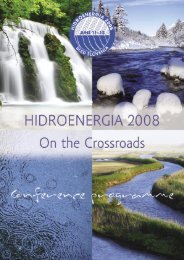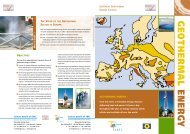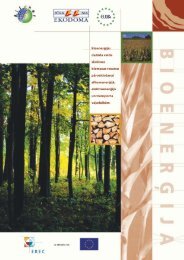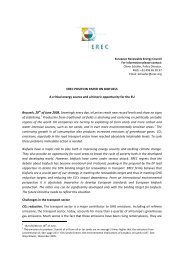CTO Assessment - European Commission
CTO Assessment - European Commission
CTO Assessment - European Commission
Create successful ePaper yourself
Turn your PDF publications into a flip-book with our unique Google optimized e-Paper software.
PELLWORM<br />
100% RES<br />
Contact: Mathias Schikotanz/Claus Zetl •Oekologisch Wirtschaften e.V<br />
Tammensiel 25a • 25849 Pellworm • Tel: +49 48441212<br />
Fax: +49 4844259 •E-mail: oekologisch.wirtschaften@t-online.de<br />
In 1997 the German island Pellworm drew<br />
up a renewable energy plan in order to<br />
present model concepts for energy supply<br />
sourced from renewables and to access a<br />
wide range of applications. The strategy<br />
for the future is to fully exploit the island’s<br />
main sources of renewables: wind, sun and<br />
biomass. Pellworm is connected to the<br />
mainland electricity grid in Germany via<br />
submarine cables. The idea is to sever this<br />
connection in the near future and create a<br />
self-sufficient, 100% RES system.<br />
The initiative<br />
The strategy set up by the island is to work<br />
towards the goal of increasing the share<br />
of renewables to 100%. Increasing public<br />
awareness of issues related to renewable<br />
energy and spreading best practices to<br />
other locations where similar potentials<br />
exist are also important motivational factors.<br />
So far 13 wind turbines have been erected<br />
to achieve the goal of exploiting the renewable<br />
energy capabilities of the island. Wind<br />
energy has by far the greatest potential of<br />
the renewable energy and there is still much<br />
room for expansion.<br />
Photovoltaic and Biomass are also being<br />
further developed. A biogas plant is in the<br />
process of being established at the current<br />
time.<br />
Pellworm local government. After this was<br />
completed three farmers took up the<br />
project and formed a society in order to<br />
implement the project. The plant is now in<br />
the development stages. Financial aid has<br />
also been received from the EU from the<br />
ALTENER Programme and from EON,<br />
then Schlewag. The current task is to acquire<br />
funding for the heat storage plant<br />
that would enable the heat from the new<br />
biogas plant to be used in Pellworm also.<br />
To combat the lack of funding, Pellworm,<br />
in conjunction with the Georesearch institute<br />
in Potsdam, held an Information Day<br />
in autumn 2001. As a result of this the<br />
University of Lüneburg and Stuttgart became<br />
interested and agreed to take over<br />
the research, that has been outlined in the<br />
Pellworm feasibility study, of the new heat<br />
storer which will be shallower (20-40 meters<br />
deep), so more cost effective to boar<br />
down to and with a higher temperature<br />
output (70 degrees) than any yet in existence.<br />
Challenges<br />
There have been some challenges posed<br />
from a lack of proactive political support<br />
in the past. These were eased when<br />
Pellworm was selected as a model village<br />
for the Expo 2000 in Germany. This meant<br />
there was great publicity and support generated.<br />
Pellworm received a greater influx<br />
of tourists as a result and the project attained<br />
high visibility.<br />
The heat production capabilities for the<br />
biogas plant will not be used under the current<br />
terms. This is due to the fact that there<br />
is not the financial capacity to set up an<br />
underground storage for the heat. The necessary<br />
funding aid is 60%, of which the<br />
EU could supply 50% and Schleswig-<br />
Holstein federal state 30%.<br />
Replication Potential<br />
For many areas heat storage would be the<br />
perfect solution. In Pellworm there is no<br />
major industry mainly residential areas but<br />
for localities that have a high demand for<br />
heat this is a really cost effective method.<br />
Pellworm has already started to contact<br />
the neighbouring Islands to disseminate<br />
information and generate support for replication<br />
elsewhere.<br />
RES Increase<br />
As a result of the initiatives on Pellworm<br />
the RES share of the island has gone up<br />
78% and once the biomass plant has been<br />
established this will further increase to<br />
92%. CO 2<br />
emissions have been reduced by<br />
80%.<br />
Innovative aspect<br />
Once the feasibility study for the Biogas<br />
plant was completed three farmers who<br />
wished to participate formed a society and<br />
adapted the project outline into a plant they<br />
could set up. Since then more people have<br />
joined the society and in this way the plant<br />
has enough financial backing and is now in<br />
the establishment process.<br />
Key facts of the project:<br />
The objective was to install PV systems with a capacity of 600 kWp and<br />
300 kWp of this is currently active<br />
There are 28 large solar thermal collectors installed with a surface area of 318 m 3<br />
5 privately owned wind turbines have been installed with an output of 680 kW<br />
There is one windpark with 8 turbines<br />
A combined heat and biomass plant is currently in the planning stages<br />
Enabling factors<br />
The cost of the feasibility study for the<br />
biogas plant was taken over by the federal<br />
state of Schleswig-Holstein and the<br />
56 <strong>CTO</strong> - Showcase


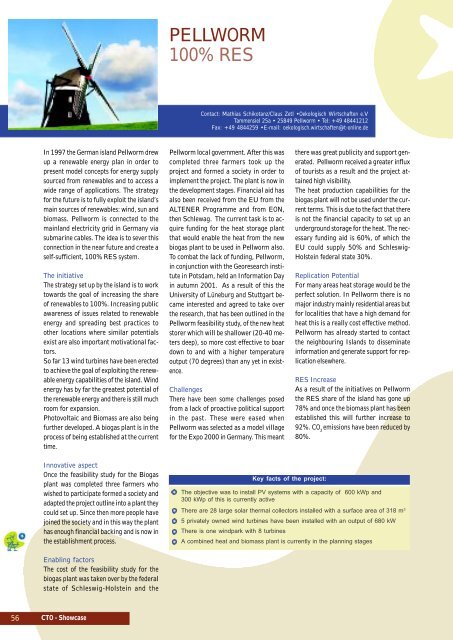
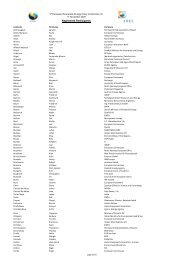
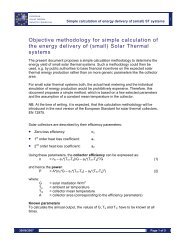
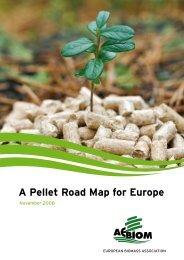
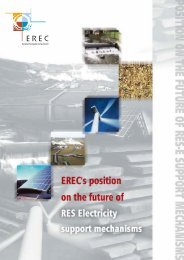
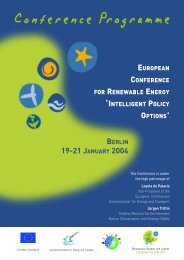
![Energy [R]evolution - Greenpeace](https://img.yumpu.com/47174859/1/184x260/energy-revolution-greenpeace.jpg?quality=85)
